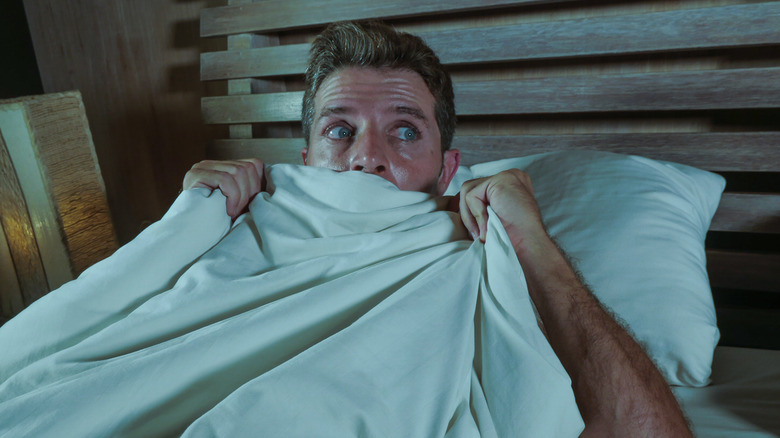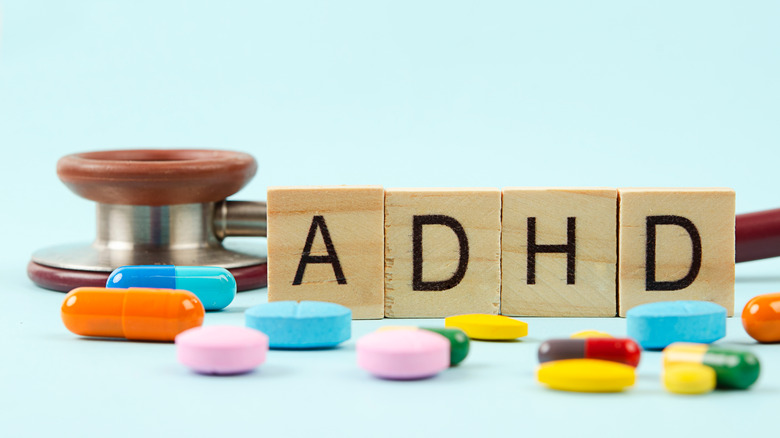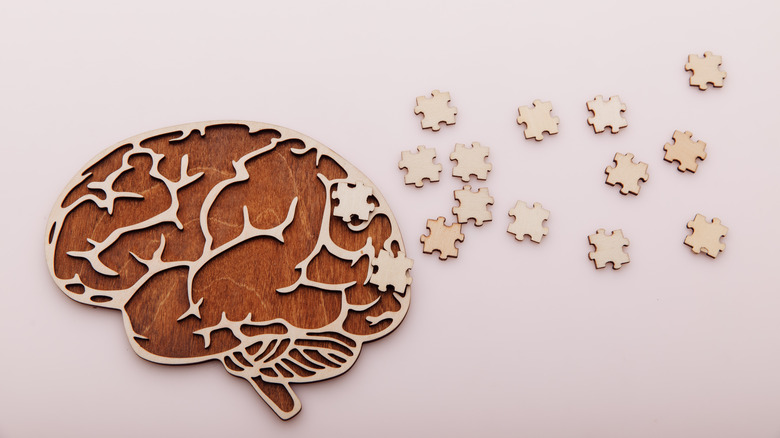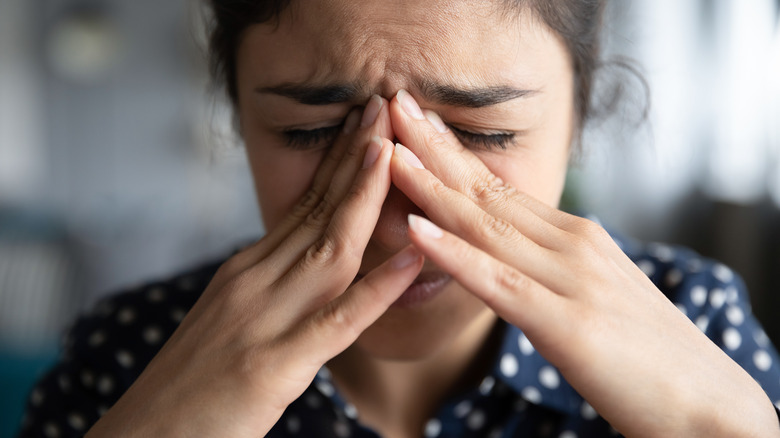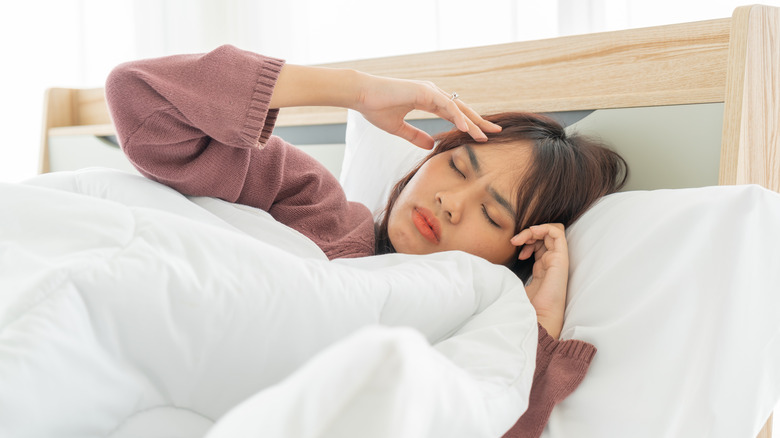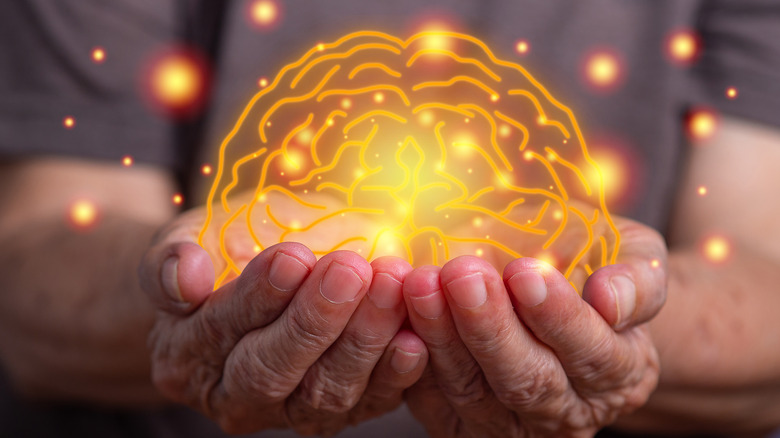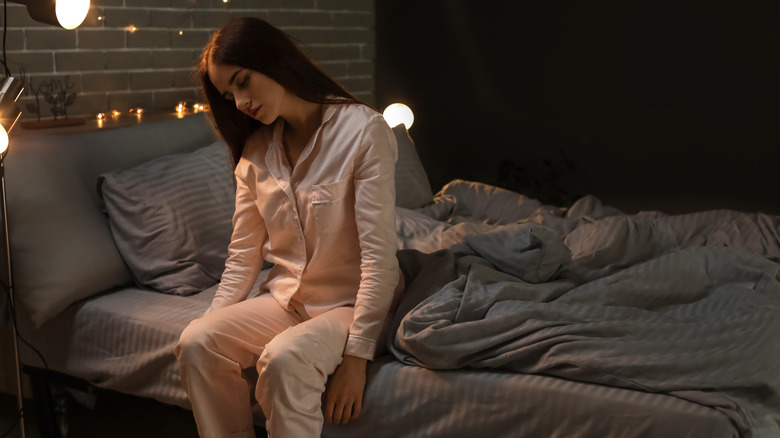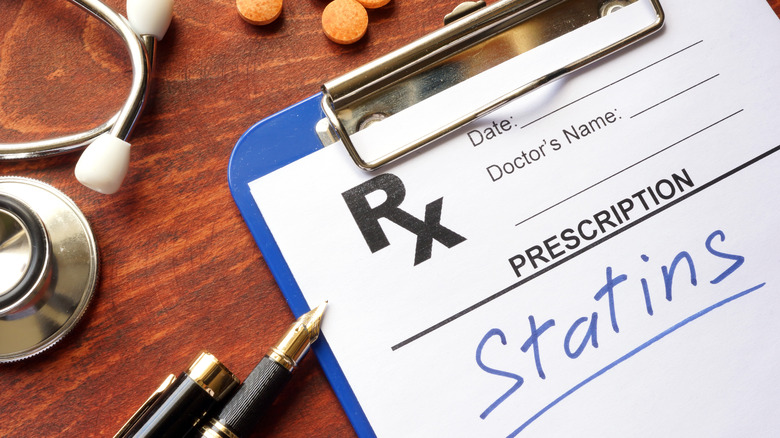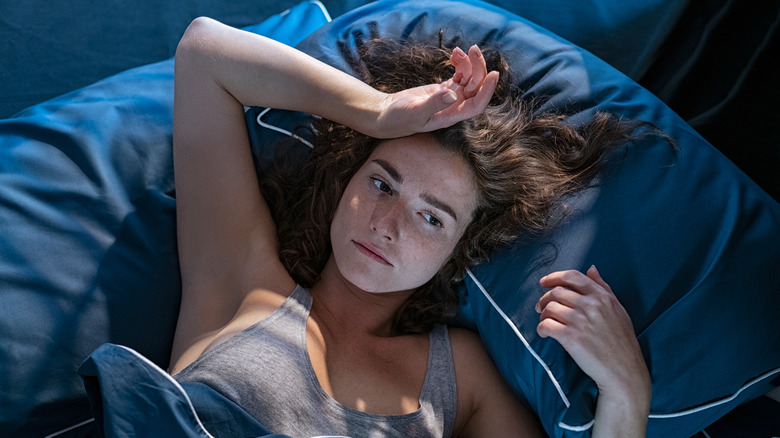Medications That Can Make You Have Strange Dreams
Have your dreams been creeping you out? Do you lay awake for hours now because you're too afraid to close your eyes? Guess what? The odd dreams might very likely be from the medications you're taking. Drugs that affect the chemical balance in your brain and disturb REM (rapid eye movement) sleep — the stage associated with dreams — can cause some downright bizarre nocturnal visions.
You see, sleep is divided into several stages and cycles of non-REM and REM sleep. The non-REM part is when your brainwaves are slowing down, your body feels increasingly relaxed, and eventually you reach deep sleep. The REM part happens about an hour and a half into falling asleep — it's the final stage of the sleep cycle, and it's a wild ride! Your brain activity perks up, your arms and legs become immobile, your pulse, body temperature, blood pressure, and breathing rise, and your eyes dart around quickly (it's called rapid eye movement). It's during this time that you dream — and those dreams may be intense, according to experts at the Cleveland Clinic.
"The purpose, triggers, and biology of dreams, both pleasant and frightening, are still some of the biggest mysteries in all of science," says Dr. P. Murali Doraiswamy, a neuroscientist at Duke University Medical School. "It could be an evolutionary defense mechanism or could be the brain's way of doing psychotherapy on itself," he told the Wall Street Journal.
Some types of medications can affect the REM stage, and not in a good way. When this period doesn't function normally because drugs are interfering with neurotransmitters, it can alter that critical REM process, making it longer, shorter, or delayed. That's when these unsettling dreams can slither into thoughts. Which types of medications can give you the creeps? More than you might think!
ADHD medications
Attention-deficit hyperactivity disorder (ADHD) is one of the most common neurodevelopmental disorders, affecting nearly 6% of children and 2.5% of adults, per the World Federation of ADHD. To treat the condition, stimulant types of drugs including methylphenidate (Ritalin) and amphetamine/dextroamphetamine (Adderall) can be tremendously helpful in boosting focus and reducing impulsive behaviors, according to WebMD, but there can be a negative side as well. Stimulants may also lead to sleep disturbances and troubling dreams (via eMedicine Health).
"It's important to address whether [nightmares] are due to a medication or if something else is going on," says Dr. Shelby Harris, former director of the Behavioral Sleep Medicine Program at Montefiore Medical Center in New York. "Don't assume that nothing can be done," she told the Wall Street Journal.
To suddenly stop taking these drugs is typically not a good idea either as that can bring on an avalanche of intense dreams too. "You'll experience more REM sleep for several days than you have in years," Dr. Robert S. Rosenberg, a board-certified sleep medicine specialist said to Women's Health. "This can result in a flood of vivid dreams as well as nightmares." WebMD points out things you can do, with your doctor's guidance, to take control of the situation. Those steps include changing your dosage or prescription.
AIDS drugs
Efavirenz (Sustiva) is a potent antiviral drug that's taken as a cocktail with other antivirals to prevent HIV (human immunodeficiency virus) from multiplying in your body (via Drugs). Vivid dreams are a well-known side effect of this powerful medication. "Sleep disturbance (somnolence, insomnia, and vivid or abnormal dreams) is particularly characteristic of efavirenz, being recorded in nearly half of cases," published the Journal of Antimicrobial Chemotherapy. Although the drug manufacturer advises taking the drug before bedtime, at least half of patients do so in the morning instead to avoid experiencing bad dreams (per NAM).
"Although you can take efavirenz with or without food, a high-fat meal increases drug levels by 60% and this increases side effects," explains HIV i-Base, a U.K.-based treatment activist group. The good thing is other effective drugs are available if the sleep disturbances don't easily go away. "Perhaps 2-3% of people switch to a different treatment within a few days or weeks," according to the group.
Alzheimer's medications
More than 6 million Americans ages 65 and older are living with Alzheimer's disease, a brain disorder that affects memory, thinking and behavior, according to the Alzheimer's Association. Commonly prescribed drugs to treat dementia in Alzheimer's patients include donepezil (Aricept) and others. The drugs improve thinking and daily functioning, but unfortunately these medications may also come with the side effect, though small, of vivid dreams (via Weill Institute for Neurosciences).
Many people with Alzheimer's disease "already might not be eating well, have cardiovascular problems, or are at risk for falls," explains the National Capital Poison Center. So when those with Alzheimer's experience vivid dreams leading to lack of restful sleep from drugs like donepezil, it can pose a real danger to their health. Forgetting doses and then taking too much of it — resulting in toxic levels — have been known to land patients in the hospital, according to the organization.
Research published in Mental Health Clinician in 2014 and in earlier studies showed that "abnormal dreams were reported in 3% of patients [in clinical trials] who received donepezil once daily." Fortunately, changing the dosing schedule to morning seemed to decrease the problem.
Antibiotics
Wondering why you've been waking up from off-the-wall dreams after starting a course of antibiotics? If you're taking ciprofloxacin (Cipro), a quinolone antibiotic used to treat things like UTIs and gastroenteritis (via WebMD), or erythromycin in the macrolide class, you may have just found the reason for your nighttime woes (via NCBI). Both drugs offer the possible bonus of terrifying dreams. "Doctors like to prescribe broad-spectrum antibiotics because we don't always know what we're treating," says Dr. Valerie Vaughn, assistant professor of medicine at the University of Michigan. "We don't want to miss anything," she told The Daily Beast.
In a 2016 case study published in the Journal of Neurogastroenterology and Motility, a young woman with gastric issues was prescribed a course of erythromycin that produced debilitating nightmares, which luckily went away after stopping the drug. When she restarted taking it weeks later, the nightmares returned. Switching to a different antibiotic finally resolved the issue. In the same report, another young woman decades earlier was taking erythromycin for acne. She also experienced terrifying dreams that went away after stopping the drug. The study's authors say they, "suspect that the antibiotic acted on the central nervous system, and in this way stimulated nightmares," according to Psychology Today. They warned that "even antibiotics may have indirect and unintentional side effects on the central nervous system, and likewise may influence and even harm psychological health."
Antidepressants
Antidepressant medications such as paroxetine (Paxil) and many others are notorious for causing bizarre dreams. Why? These drugs tend to suppress REM sleep. The resulting effect is you wake up more frequently throughout the night, and those skimpy, disjointed bits of sleep may lead to vivid dreams, even nightmarish ones (via WebMD).
"This is a very common complaint," declares Dr. Andres San Martin, a psychiatrist in New York City, who says that disturbed dreams are a frequent challenge with antidepressant medications. "You put a patient on an antidepressant and routinely, they'll say, 'You know I'm feeling better, but I'm having very vivid dreams.' The emotion and passion can be quite overwhelming," he told the Wall Street Journal.
Most of us do our dreaming during REM sleep, so drugs that interfere with that phase have a good chance of messing up sleep patterns. If you abruptly stop the medication then your brain can respond with what's known as a rebound effect. "Rebound" refers to withdrawal side effects that can keep you up at night.
"Dreams that occur during REM rebound tend to be nightmares," explains Gary Wenk, professor of psychology, neuroscience, molecular virology, immunology, and medical genetics at Ohio State University. "The newer antidepressant paroxetine, Paxil, has the highest incidence of nightmare production; it acts by preventing the reuptake of serotonin," he published in Psychology Today. "Because so many people take one of these common medications daily, the probability to experience recurring drug-induced nightmares is quite high."
Antiepileptic drugs
Every year up to 11% of Americans have a panic attack, which is a sudden and debilitating onset of fear and anxiety, according to the Cleveland Clinic. Clonazepam (Klonopin), an anticonvulsant and antiepileptic medication, is one type of drug that's effective in helping people navigate through this frightening condition, per WebMD. It's highly addictive though, and most people develop a physical dependence on the drug in just a few weeks, according to Verywell Mind. So when you stop taking this type of medication, you can experience withdrawal symptoms that include nightmares.
Klonopin is a sedative. It's in a class of drugs called benzodiazepines, and their calming effect on the central nervous system works by raising the levels of the neurotransmitter gamma-aminobutyric acid (GABA), reported Medical News Today. The nightmares can happen because of how the drug affects your REM sleep, which is an important part of the sleep cycle for memory, mental focus, and mood. The National Sleep Foundation explains that, "Without this critical [REM] sleep stage, your immune system could be weakened, you may experience pain more deeply, and the growth of new healthy cells and tissue in the body might be blocked." Verywell Mind advises that, "The best way to successfully quit Klonopin is to follow a slow tapering schedule."
Antihistimines
Histamines usually do a lot of good things. WebMD describes them like, "bouncers at a club... They help your body get rid of something that's bothering you — in this case, an allergy trigger, or allergen." When those same chemicals overreact and clash with your immune system, that's when you commonly get watery eyes, itchy skin or a stuffy nose. If you have a food allergy, the Mayo Clinic explains, histamines can constrict muscles making it harder to breathe, or cause swelling, hives, or vomiting. At its most severe, anaphylaxis, the resulting symptoms are not just annoying — they can kill.
"Allergies are one of the most common chronic conditions in the world," notes the Cleveland Clinic, citing some 40 to 50 million allergy sufferers in the United States alone. Antihistamine prescriptions and over-the-counter drugs that treat allergies are often quite effective, but they also have a reputation for causing strange dreams. The older first-generation medications are especially prone to this side effect, including the widely used antihistamine diphenhydramine (Benadryl) per GoodRX Health. Why? The Wall Street Journal reports it's "largely because they interrupt natural REM and non-REM sleep cycles." Dr. Philip Alapat, assistant professor of medicine at Baylor College of Medicine warns that, "Use of antihistamines can lead to sleep walking and other parasomnias. That can definitely occur with Benadryl just as with other hypnotic agents like Ambien."
Cold and flu medications
Over-the-counter cold and flu medications may seem convenient and pretty harmless, but beware that some may lead to disturbed sleep and wacky dreams. Who hasn't swigged down a cupful of NyQuil hoping that its licorice-flavored green goodness will soothe your cold symptoms and knock you out for the night? In fact, a lot of OTC cold and flu concoctions like NyQuil often have "more ingredients than you really need to best treat your symptoms," according to GoodRX Health, and that's significant because the more drugs that are in them, the "greater risk for side effects."
Doxylamine, an antihistamine sleep-aid, is a common ingredient in OTC medications (via Shape), and it can be a cause of bizarre dreams. "The moment the doxylamine wears off, acetylcholine comes back with a vengeance," Subhajit Chakravorty, assistant professor of psychiatry in the behavioral sleep medicine program at the University of Pennsylvania, told Vice. Acetylcholine stimulates REM sleep. "Anything that blocks acetylcholine, like doxylamine, will put off REM sleep." When the antihistamines wear off, REM sleep takes over quickly and the rush of brain activity can bring on some pretty bizarre dreams.
"Although the mechanism isn't entirely understood, the theory is that [antihistamines] alter rapid-eye-movement (REM) sleep," explains Dr. Alexandra Sowa, clinical instructor of medicine at Weill Cornell Medical College in New York City. "Most dreams happen during this stage of sleep, so any changes to REM can lead to more pronounced, vivid dreams — even nightmares," she told Women'sHealth.
Heart and blood-pressure drugs
Beta blockers come in handy to treat a variety of heart issues, including high blood pressure, congestive heart failure, abnormal heart rhythms, and chest pain, according to the Texas Heart institute. They slow the heart rate and lower blood pressure by blocking the hormone adrenaline. Disturbed dreams are sometimes a side effect of beta blockers and this problem generates the most patient complaints, the institution says.
According to a 2020 case report that called out metoprolol (Lopressor and Toprol) and other beta-blockers "the most common symptoms are psychiatric conditions, bizarre and vivid dreams, sleep disturbances, delirium, psychosis, and visual hallucinations." The report also noted that the elderly need especially close monitoring for "adverse neurological symptoms," when they are on beta-blockers.
For better sleep and reduction of trippy dreams, Armon B. Neel, Jr., certified geriatric pharmacist, suggests that switching to benzothiazepine calcium channel blockers for blood pressure can be a safer and better tolerated treatment than beta-blockers for the elderly (via AARP).
Parkinson's disease medications
Drugs for Parkinson's disease increase dopamine, the Parkinson's Foundation explains, and dopamine is also the area of the brain responsible for dreams. Cedars-Sinai adds that a lack of dopamine is what scientists believe causes Parkinson's disease, a progressive nervous system disorder that the organization says affects nearly 1 million Americans and more than 10 million people worldwide.
Treatments for this progressive nervous system disorder include medications like amantadine (Gocovri). The drug helps treat the symptoms of the condition but it also comes with a number of troubling side effects ranging from impulsivity and binge eating to hallucinations and vivid dreams, according to Medical News Today.
REM behavior disorder is very common in Parkinson's patients who will act-out dreams by movement or yelling out. "Vivid dreams or nightmares can be the result of a nighttime dose of dopamine medication," says the Parkinson's Disease Clinic and Research Center. Normally a person gets temporary paralysis of their extremities during REM sleep, the Mayo Clinic notes, but with REM sleep behavior disorder, you'll get violent arm and leg movements — kicking, punching, or jumping from the bed — when acting out your dreams, and it can be dangerous.
Sleep aids
Since the beginning of the COVID-19 pandemic, more than half of Americans report they've had sleeping issues, or "COVID-somnia," including staying or falling asleep, and disturbing dreams, per a 2021 online survey by the American Academy of Sleep Medicine (via Consumer Reports).
Many people desperate for shut-eye turn to sleep aids, but taking them regularly may bring on other issues such as drug dependence — and these aids can be a slippery slope for other problems. "Ambien and its generic, zolpidem tartrate, can produce myriad side effects including bad dreams and sleepwalking," says RXSaver. And even seemingly harmless melatonin supplements, whose sales skyrocketed more than 42% in 2020 (via Business Insider) have been known to increase vivid dreaming, according to Healthline. These types of drugs may dramatically alter the levels of dopamine in the brain, but as addiction medicine specialist Dr. Stuart J. Finkelstein points out, "Not everyone gets these responses, as many times it depends on the dosage and other medications they may be taking" (via Women's Health).
Smoking-cessation drugs
The nicotine patch came to market in 1992, invented at UCLA by a pharmacologist (via the Los Angeles Times). It's a transdermal patch that sticks to your arm or chest like a Band-Aid and helps smokers quit the habit by providing controlled doses of nicotine that taper off over time. This approach helps reduce nicotine withdrawal symptoms, reports Verywell Mind, but the patch is not without side effects. Patricia Mallaber, a nurse practitioner with Wilmot Cancer Institute's tobacco dependence treatment program in New York says, "The nicotine patch can in fact disrupt sleep and cause bad dreams" (via the University of Rochester Medical Center).
In addition to the patch, smokers who want to quit can also choose from an array of nicotine gums, sprays, lozenges, and inhalers, or even antidepressant pills such as bupropion (Wellbutrin) and smoking-cessation aids like varenicline (Chantix), says the Mayo Clinic.
"I most commonly see strange dreams as a side effect of antidepressants and smoking-cessation medications, but nightmares are linked to everything from pain medications to blood pressure agents," Dr. Alexandra Sowa told Women's Health. While the 24-hour nicotine patch may cause sleep disturbances like insomnia or "especially vivid dreams," reports Kaiser Permanente.
Statins
Statins lower the bad LDL cholesterol in your blood that can cause heart attack or stroke. Although rare, some statins like simvastatin (Zocor) have been known to cause nightmares or vivid dreams, according to RXSaver. Researchers have found that fat-soluble statins like Zocor cause the most problems because they "can more easily penetrate cell membranes and make their way across the blood-brain barrier, which protects the brain from chemicals in the blood," according to Dr. Armon B. Neel, Jr. (via AARP).
Up to 15% of people treated with statins, including the elderly who are at highest risk of issues with the drug, have an intolerance to them, reports the American College of Cardiology. Still, other doctors dismiss complaints of insomnia and sleep disturbances. "The best explanation is the 'nocebo' effect — the opposite of the placebo effect," says Peter Sever, professor of clinical pharmacology at the National Heart and Lung Institute at Imperial College London. "It's where patients experience negative side effects of a drug because they've been expecting to, after seeing warnings or widespread media reporting about them," he told the British Heart Foundation.
Steroids
Corticosteroids such as prednisone and methylprednisolone (Medrol) can affect your brain chemistry and lead to mood issues and nightmares, according to New York-based Sleep MD. These immune-system suppressants are chemicals that mimic your body's natural hormones to treat inflammatory conditions ranging from hives to asthma to rheumatoid arthritis. You may not have any side effects from these drugs, but if you take them at higher doses, for longer time frames, combine them with other medications (even NSAIDS), or if you abruptly stop taking them, watch out. Their nasty side effects may include mood swings, anxiety, stomach issues, and sleep problems, according to the Journal of Allergy, Asthma & Clinical Immunology.
Insomnia is a really common side effect of steroids. Verywell Health reports that "taking [a] dose of prednisone too late in the evening may affect your sleep." And that means it can generate some disturbing dreams by disrupting your normal REM cycle. So a great way to minimize sleep problems from steroids, say the experts, is by taking the once-a-day dose early with breakfast.
